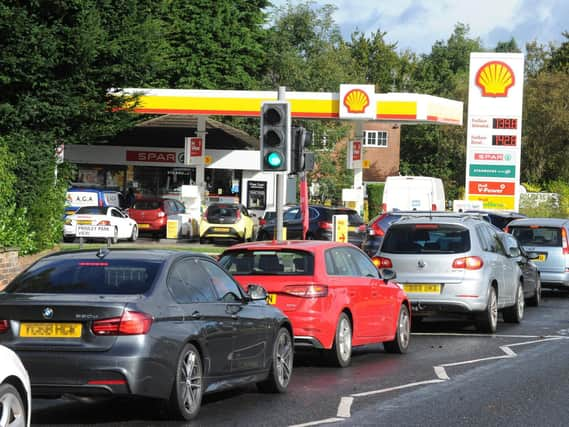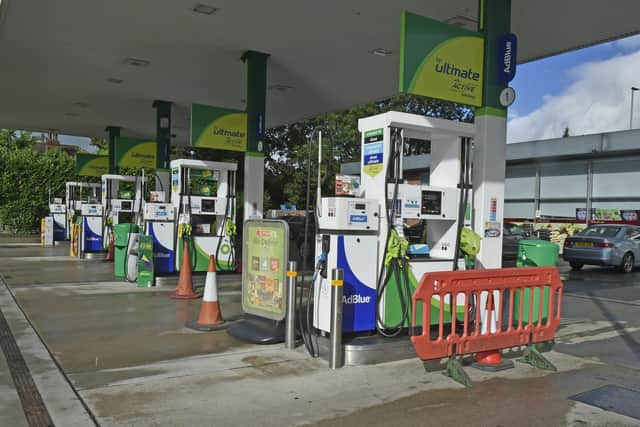Motorists urged to only buy fuel in usual amounts as nurses warn patient safety may be compromised by shortage at stations


The UK fuel industry - including BP, Shell and Esso - issued a joint statement last night saying it was working with the Government to ensure there is enough fuel accessible to drivers across the country and saying they “expect demand will return to its normal levels in the coming days”.
In the statement issued by the Department for Business, Energy and Industrial Strategy, they said: “There is plenty of fuel at UK refineries and terminals, and as an industry we are working closely with the government to help ensure fuel is available to be delivered to stations across the country.
Advertisement
Hide AdAdvertisement
Hide Ad"As many cars are now holding more fuel than usual, we expect that demand will return to its normal levels in the coming days, easing pressures on fuel station forecourts. We would encourage everyone to buy fuel as they usually would.”


It comes after Boris Johnson drew back from plans to deploy troops to ensure fuel supplies reach forecourts. Downing Street said the Government was monitoring the situation on a daily basis but there were currently no plans to use the military to drive fuel tankers.
Environment Secretary George Eustice insisted there was no need for shortages at the pumps and blamed motorists for filling up when they did not need to.
“There isn’t a shortage,” he said.
“The cause of these current problems is that panic-buying episode and the most important thing is for people to start buying petrol as they normally would. There does come a point – as we saw during a previous episode of panic buying during the pandemic on food – where things settle down and people get used to it, and return to life as normal again.
Advertisement
Hide AdAdvertisement
Hide Ad“The sooner people do that the better. The only reason we don’t have petrol on the forecourts is that people are buying petrol when they don’t need to.”
But with many petrol stations now empty of fuel, the Royal College of Nursing and British Medical Association have warned continuing problems could mean patient care being compromised and called for health and care workers to be prioritised.
Patricia Marquis, director for England at the Royal College of Nursing, said: “Nursing staff do valuable work, often travelling long distances to get to work or see their patients in the community.
“Health and care services, already struggling with widespread staffing shortages, cannot afford to lose any more staff because they’re unable to travel.
Advertisement
Hide AdAdvertisement
Hide Ad"We already know some nursing staff are warning their employers they may not be able to attend tomorrow to ensure shifts can be safely staffed. Health and care workers need to be a priority or patient care will be compromised.”
London Mayor Sadiq Khan said designated petrol stations should be reserved for essential workers in a repeat of what happened during the September 2000 fuel crisis.
John McSorley, strategic commander for Yorkshire Ambulance Service, said it has “sufficient fuel stocks” for emergency vehicles but admitted some staff are finding it difficult to fill up their own vehicles to get to work.
“We have robust business continuity plans in place to ensure we are able to respond to patients needing our assistance and can invoke additional measures should they be required.
Advertisement
Hide AdAdvertisement
Hide Ad"We know that, like many others, some colleagues have found it difficult to obtain fuel for their own vehicles and we have a staff transport plan that can be activated should the situation escalate further.”
Mark Fairhurst, the national chairman of the POA union which represents prison guards and staff at correctional and secure psychiatric facilities, said he was receiving reports of workers being unable to turn up for shifts because they cannot get any fuel and called for the matter to be addressed “urgently”.
On Twitter, he said: “Getting reports of staff being unable to attend for duty because they have no fuel and unable to fill up anywhere. No contingencies in place and no desire from Government to address this. If we can’t get staff on duty we can’t unlock. This needs to be addressed urgently.”
The Petrol Retailers Association (PRA) blamed the dash to fill up on the leak last week of concerns by BP about some shortages of tanker drivers needed to deliver fuel supplies. Fuel prices have hit an eight-year amidst the shortages, with the average price of a litre of petrol hitting 136.59p on Sunday.
Advertisement
Hide AdAdvertisement
Hide AdPRA chairman Brian Madderson said that the solution ultimately lay in the hands of motorists. “If they start buying in their normal quantities, £20 worth, 20 litres to fill up every week, we could see by the end of this week some return to normality – it won’t be perfect, but some return.”
Martin Tugwell, chief executive of Transport for the North, said the ongoing situation was a reminder of the need to build a “resilient” public transport network in the longer-term.
“We’ve got to have a choice for people in terms of transport so that they’re not dependent upon one mode like the car and they have alternatives.”
The Government has temporarily suspended competition laws to allow the industry to share information so it can target areas where fuel supply is running low and is creating 5,000 three-month visas for foreign lorry drivers.
Advertisement
Hide AdAdvertisement
Hide AdBut Edwin Atema from the Dutch FNV union, which represents drivers across Europe, said it would not be enough to attract drivers back following Brexit.
He told the BBC: “The EU workers we speak to will not go to the UK for a short-term visa to help UK out of the **** they created themselves.”
School closures should be 'last resort'
Headteachers are hoping that they will not be forced to revert back to online lessons as a result of fuel shortages, a school leaders’ union has said.
Geoff Barton, general secretary of the Association of School and College Leaders (ASCL), said: “Schools and colleges are operating under a great deal of pressure at the moment because of the situation with Covid infections.
Advertisement
Hide AdAdvertisement
Hide Ad"The last thing they need is the added pressure of fuel shortages with the potential for this to mean that staff, pupils and suppliers are unable to get to school. We very much hope the situation is resolved rapidly before it causes disruption.
"There is the option for remote education, which schools and colleges have shown themselves to be very adept at providing through the pandemic, but this is very much a last resort and they will be hoping it doesn’t come to that.”
Support The Yorkshire Post and become a subscriber today. Your subscription will help us to continue to bring quality news to the people of Yorkshire. In return, you'll see fewer ads on site, get free access to our app and receive exclusive members-only offers. Click here to subscribe.
Comment Guidelines
National World encourages reader discussion on our stories. User feedback, insights and back-and-forth exchanges add a rich layer of context to reporting. Please review our Community Guidelines before commenting.